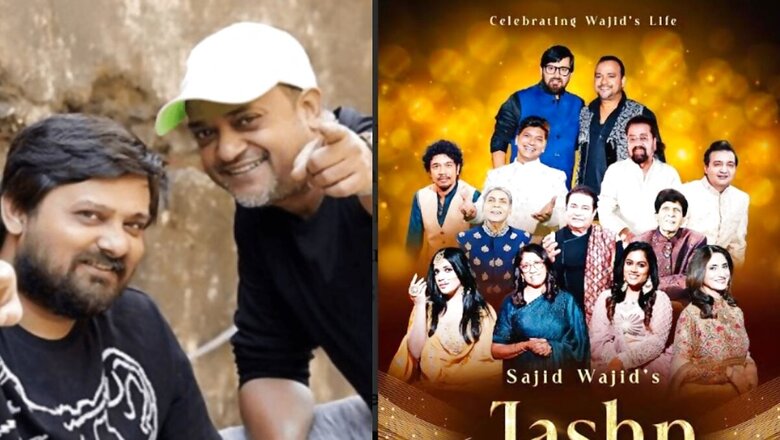
views
Renowned composer Sajid Khan, one-half of the iconic duo Sajid-Wajid, is turning up the nostalgia with a heartfelt musical gift to his late brother Wajid Khan—’Jashn-E-Ghazal.’ Released on what would have been Wajid’s birthday, this project isn’t just a tribute; it’s a soulful time machine, transporting listeners back to the golden era of ghazals, all while keeping Wajid’s memory alive.
‘Jashn-E-Ghazal’ is like a perfectly brewed cup of chai—rich, warm, and filled with depth. It features ten spellbinding ghazals performed by a lineup that’s nothing short of a musical dream team: Padma Shri Ustad Ahmed Hussain, Padma Shri Kavita Krishnamurthy, Shaan, Muskan, Papon, Padma Shri Hariharan, Padma Shri Anup Jalota, Mohammed Vakil, Sayli Kamble, and Niti Dinesh Jain. Each artist adds their own flavor, blending classic charm with a touch of modern flair—perfect for seasoned ghazal lovers and the new-gen listeners looking to discover something timeless.
Produced and composed with Sajid-Wajid’s signature touch and directed by Nadeem Akhtar, ‘Jashn-E-Ghazal’ is a beautiful mash-up of the old and the new, capturing the essence of ghazals while giving it just the right contemporary twist. It’s designed to tug at your heartstrings and remind you that some tunes are simply forever.
In an exclusive chat with News18 Showsha, Sajid Khan spilled the beans on how this deeply personal project came together—from getting India’s top voices on board to the emotional journey of creating an album that’s as much about remembering Wajid as it is about celebrating their love for melodies that linger.
Q1: Jashn-e-Ghazal is a beautiful tribute to your brother, Wajid Khan. What inspired you to choose ghazals as a medium to celebrate his legacy?
Sajid Khan: You know, I’ve been a fan of legendary singers like Jagjit Singh, Anup Jalota, and Pankaj Udhas. I mean, they set a trend, and now that trend is fading. It’s like, how can something as integral to India as ghazals just disappear? It’s like saying India no longer has dal and chawal—it’s unthinkable. A few months back, I met Kavita Ji, and she sang a song for me from Hum Dil De Chuke Sanam. Her singing touched me deeply. I kept watching that video and felt so moved each time. I realized that there are talented legends still around, but no one is collaborating with them. These are people with immense talent, and yet no one is utilizing their skills.
So, I thought, why not do something beautiful? Ghazals have always been a part of our lives. Since childhood, I played the tabla while Wajid played the guitar, and we performed alongside many ghazal singers. This genre is ingrained in us. I wanted to bring back the essence of ghazals with simplicity and focus on the artistry. That’s how I decided to create this project under the Talim Music channel. It’s not about showcasing flashy cars or dancers in Dubai; it’s about pure, soothing music.
Q2: The first ghazal, ‘Jab Bhi Kisi Nigah Se,’ sung by Ahmed Hussain Ji and Mohammad Hussain Ji, is receiving great praise. How did you go about crafting such a soulful mix, especially with the blend of tabla and drums?
Sajid Khan: Many people told me to add big instruments, to make it grand. But I realized that simplicity is beautiful. I wanted the focus to be on the voice of the artist and the poetry, not on over-the-top arrangements. It’s all about keeping it minimalistic. My main goal is to get people to subscribe to Talim Music, so that I can keep experimenting and creating beautiful work. And you know, I’m getting such positive messages from people, appreciating that I’ve brought back something meaningful.
Q3: You’ve collaborated with many legendary artists like Hariharan, Kavita Ji, and Shaan for this project. What was it like to work with such talents and have them be a part of this tribute to Wajid?
Sajid Khan: First of all, I am extremely grateful to all these artists. When I reached out to them, they were more than willing to participate, even though I wasn’t in a position to pay them lavishly. They all said, “For Wajid, we are with you.” That made me feel so happy. It was like the world had given Wajid a gift through this project. Usually, people move on quickly, but I won’t let the memory of my brother fade. He will live on as long as I’m alive.
Q4: You’ve mentioned that Wajid was not just your musical partner but also your guide and anchor. While working on this tribute, how did you feel his influence or presence?
Sajid Khan: I can still feel his presence with me. He loved ghazals, and he used to say that there should be more of them in films. So, I thought, why not bring back ghazals in his memory? I’ve involved many talented artists like Papon, my daughter Muskaan, and others. It’s a way of keeping his spirit alive through music.
Q5: You’ve mentioned how your brother’s influence shaped your musical journey. How did you translate that into Jashn-e-Ghazal?
Sajid Khan: Wajid always loved the idea of bringing ghazals back into mainstream music. I felt that this was the perfect way to honor his wishes. We are blessed to have artists like Hariharan and new talents like Muskaan participating in this project. And honestly, I wasn’t sure how today’s audience would respond to ghazals, but the feedback has been amazing. Young listeners are appreciating the poetry and the soothing nature of the music, and that’s what we aimed for.
Q6: Grief often has its own language, and silence is a huge part of it. Were there moments during this project where the silence spoke louder than the music? How did you channel that into your creative process?
Sajid Khan: I have to give a lot of credit to my cousin, Mohammad Waqeel, who helped me immensely with this project. He took the lead on many aspects, and I couldn’t have done it without him. There were many moments where I felt overwhelmed, but the support from people around me kept me going. The creative process became a way of channeling the emotions I felt after losing Wajid.
Q7: The visuals of this project are stunning. How did you bring such a classic touch to the videos, like the reference to Rekha Ji’s iconic Umrao Jaan?
Sajid Khan: I told Nadeem Akhtar, the visual director, that I wanted the simplicity of Umrao Jaan. Remember how Rekha Ji just sat there, with her expressions doing all the work? There was no need for elaborate dance moves or outdoor locations. That’s what I wanted—a focus on the expressions, the subtlety, and the elegance. And Nadeem understood that vision perfectly.
Q8: You’ve managed to blend modernity with tradition in this album. How do you think this will impact both young listeners and longtime fans of ghazals?
Sajid Khan: I believe it will connect with both audiences. Lounge music has its roots in ghazals, just like how qawwali has evolved into different forms over time. I’ve kept the fusion very light—just a hint of modern elements without overpowering the essence of ghazals. I want people to relax and enjoy the simplicity, especially on a Sunday morning with a cup of tea.
Q9: Is there a particular ghazal from this project that holds a special place in your heart?
Sajid Khan: Yes, Kavita Ji’s ghazal holds a very special place in my heart. I have cried listening to it many times. There’s a line that says, “Bhulne Waale Zara, Woh Bhi Zamana Yaad Kar’.” It touched me deeply, and the way she has sung it is just so beautiful. When she came to my studio, she recorded it in just 15 minutes—no issues with scale, no need for retakes. It’s a testament to her talent and experience.
Q10: You’ve spoken about the current music landscape in Bollywood. What changes would you like to see?
Sajid Khan: Look, changes are a part of any industry, but the changes happening in the music industry aren’t always for the better. Lyrics today have become quite superficial. There’s this trend where people think creating something flashy will guarantee success. But, as I see it, such trends rise quickly and fade away just as fast. Our country thrives on melody, on songs that resonate with the soul.
India is unique—our culture, diversity, music, dance, everything is special. I’ve traveled the world, and there’s nothing like the warmth and joy you find in India. But we need to preserve the essence of our music and not get lost in fleeting trends.
Q11: You’ve spoken about your love for India’s rich cultural diversity. How does that influence your approach to creating music?
Sajid Khan: I truly believe in creating music that respects the family values and traditions of our country. I never want to make music that is divisive or that would make families uncomfortable. My aim has always been to create songs that bring people together, that parents and children can enjoy together. That’s what makes music special—it has the power to unite.
Q12: You’ve been working on independent projects lately. Are there any plans to return to composing music for films?
Sajid Khan: Brother, let me tell you something—I’m more than ready. I’ve prepared a lot of material. I’m not one to go around begging for work, but I believe asking for opportunities is my right. If they come my way, great. If not, I’ll keep doing what I do. I am confident in my work. It’s true, after Wajid passed, some people hesitated to approach me. But I just want to remind them that even though one lion is gone, the other is still here. And when I return, I’ll make my mark.
Q13: How did the film industry support you during the tough times, especially after Wajid’s passing and during the pandemic?
Sajid Khan: Look, everyone in the world seeks help at some point, even the wealthiest. I’ve seen people who have everything, still asking for more. So, I don’t ask for anything from others—I ask from above, from God. During the pandemic, I closed my academy, refunded all fees, and made sure no one had any complaints against us. We went through a tough time, but I didn’t want anyone to say we took advantage of the situation.
Q14: Jashn-e-Ghazal aims to connect a new generation of listeners with ghazals. How do you hope this project will impact them?
Sajid Khan: I believe this project will resonate with both old and new listeners. Ghazals have an inherent depth that can touch hearts, and through Jashn-e-Ghazal, we’ve tried to maintain that essence while making it accessible to younger audiences. Lounge music, which has become popular today, has its roots in the soothing rhythms of ghazals. By blending traditional elements with a slightly modern touch, I hope to introduce the richness of ghazals to those who may not have been exposed to it before. It’s about creating a space where people can unwind, reflect, and experience the beauty of poetry and melody.
Q15: Can you share a memorable moment during the making of this album that stands out to you?
Sajid Khan: One moment that truly stands out is the recording session with Kavita Ji. She came to the studio, and within 10 to 15 minutes, she had recorded her ghazal without a single issue. Watching her sing with such ease and emotion was incredibly moving. It reminded me of the power of true talent and the magic that happens when an artist pours their heart into a song. It was one of those moments where I felt that all the effort we put into this project was worth it.
Q16: You’ve spoken about how personal this project is to you, especially as a tribute to Wajid. How do you balance the emotional aspect with the professional demands of creating music?
Sajid Khan: It’s a delicate balance, but I try to focus on the positive energy that Wajid left behind. Of course, there are days when the grief feels overwhelming, but then I remember the joy he found in music. That motivates me to keep going. While working on Jashn-e-Ghazal, I made sure to channel those emotions into the creative process rather than letting them hold me back. I think about what Wajid would have wanted—he would have wanted me to continue, to keep creating, and to keep pushing the boundaries of music.
Q17: What’s next for you after Jashn-e-Ghazal? Any new projects or ideas you’re excited to explore?
Sajid Khan: Right now, my focus is on making Taaleem Music a platform where people come for quality music. After Jashn-e-Ghazal, I’m planning to continue experimenting with different genres and styles, while keeping the essence of true music alive. I want to keep exploring and working with both new and established artists. I believe there’s so much talent out there that deserves a platform. Beyond that, I have some new concepts in mind, which I hope to bring to life in the coming year. It’s all about keeping the spirit of innovation and creativity alive.
Q18: How do you see the future of ghazals in the Indian music industry? Do you think there’s room for a revival?
Sajid Khan: Absolutely, I believe there is a future for ghazals in the Indian music industry. The love for good poetry and soulful melodies can never truly disappear. Yes, trends change, and modern music has its place, but there will always be a section of listeners who crave something deeper, something that speaks to the soul. With platforms like Talim Music, I hope to play a part in that revival, bringing ghazals back into the spotlight, not just as a nostalgic throwback, but as a relevant and living art form. It’s all about presenting it in a way that appeals to today’s audience while preserving its essence.
Q19: You mentioned earlier how close you and Wajid were as brothers. If he were here today, what do you think he would say about Jashn-e-Ghazal?
Sajid Khan: If Wajid were here today, I think he would be proud. He always had a soft spot for ghazals, and he often talked about their beauty. I can almost hear him saying, “Bhai, you did a great job. This is what we needed.” He was always encouraging, always pushing me to do better. Even now, when I work on these tracks, I feel like he’s guiding me. In a way, this whole project feels like a conversation between us—me here, making the music, and him watching over from wherever he is. That thought gives me comfort and drives me to keep going.
Q20: Finally, what message do you want to leave with your listeners and fans through Jashn-e-Ghazal?
Sajid Khan: My message is simple: cherish the beauty of music, the depth of poetry, and the richness of our cultural heritage. Ghazals are a treasure that belongs to all of us, and through this project, I hope to remind people of that. I want listeners to take a moment to slow down, to appreciate the magic of words and melody, and to find a little peace in the chaos of life. And most importantly, I want to say that as long as I’m here, I’ll keep creating music that comes from the heart. Thank you to everyone who has supported us so far. Let’s continue this journey together, celebrating music and the memories that come with it.


















Comments
0 comment